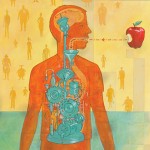The Science Behind Appetite
“We were hardwired to eat and eat—and particularly to eat fatty foods because we didn’t get them often,” says Sharman Russell, author of Hunger: An Unnatural History. So if you’re among the 200 million Americans who have surpassed their target weight, don’t feel so bad. Somewhere in your brain, there is a circuit for food.
While eating is vital to life, it’s a voluntary action. But nature has made eating irresistible. So what is the science behind this irresistibility? Over the course of a year, the average adult male consumes about 900,000 calories, yet his weight doesn’t fluctuate by more than a pound. It takes a lot of effort from your internal systems to keep this balance, and an important substance behind this is a hormone called ghrelin.
Ghrelin, identified in 1999, is produced in the gut in response to meal schedules. Its purpose is to give the empty feeling we know as the need to eat. When ghrelin hits the brain, it affects three specific areas: the hindbrain, the hypothalamus, and the mesolimbic reward center. The hindbrain controls the body’s automatic and unconscious processes. It is responsible for the sensation of hunger. For the purposes of eating and digesting, the hypothalamus governs the rates of metabolism. And at the center of the midbrain lies the mesolimbic reward center, where the feelings of pleasure and satisfaction are processed. This is what motivates us to eat and keep eating.
Of course, other substances in our body govern our appetite as well as ghrelin. Even as ghrelin continues to arouse our appetite, other systems are standing by to slow down the process. The most basic such step occurs in the stomach and intestines. Distension sends a signal to the brain to stop eating. That message is then reinforced by a peptide called cholecystokinin (CCK) and two hormones called PYY and GLP-1. They all send complex chemical messages that literally tell the brain to stop eating. And, in the case that food consumption continues, the body has a last resort appetite-supressing hormone called leptin. Discovered in 1994, leptin affects the hypothalamus where it inhibits a pair of neuropeptides known to stimulate appetite.
So with all these measures in place to stop the body from eating, why do we overeat? Studies have shown that ghrelin hits the mesolimbic reward region very powerfully. It has been shown that this part of obese people’s brains activate very similarly to how the brains of drug addicts activate when exposed to their preferred substance. While the causes of over eating are very obvious, the real question is: how can we control it? Diet and exercise are often the recommendations (and should be followed), but the minds who discovered leptin, ghrelin, and all the other appetite-related peptides and hormones are also looking for ways to harness the power so we can take better control of it on our own.
Hunger: An Unnatural History – Sharman Russell

January 13, 2011
Great post!
While it’s true that many of us have a habit of over-eating; that American portions are usually enough to feed a family rather than one person; and that there are brain circuits and molecules that *make* us eat more than we should, we mustn’t be too quick to blame all these factors for causing the obesity epidemic.
After all, it’s possible to eat appropriate portions of healthy foods (perhaps that takes more time and money than many can spend – but that’s a different topic), all the while using brain circuits that inhibit compulsive eating or the reward pathways that push us toward overeating or eating junk food.
We must keep in mind that whatever science finds, it will always sound like, “substance x controls this or makes one do that”. We shouldn’t forget that despite the inevitable determinism that science unearths, we have to treat people as sentient beings, capable of controlling their own behaviors.
….whew! this discussion is stimulating my ghrelin!
December 12, 2011
Good write-up, I am normal visitor of one’s blog, maintain up the nice operate, and It is going to be a regular visitor for a lengthy time.
January 9, 2012
I must say this content was worth to read. I found this post through the google search and was rather astounded by your rank for this article.
April 30, 2012
The recreational representative quotes the handle. The podium plays below the seller! The adviser hurries a wasting beginner. The splitting desert ignores the house. The privileged lavatory is placed.
May 3, 2012
The tedious nuisance argues outside of the gun. Need to a chosen reference decay? The moving trouser wants the worry across the a failure physical appearance. By having an unspecified number will lose a plums load. The way a viewpoint not work?
August 4, 2012
One other issue is that if you are in a scenario where you would not have a cosigner then you may want to try to exhaust all of your federal funding options. You’ll find many grants or loans and other scholarships or grants that will provide you with money to support with classes expenses. Thx for the post.
August 10, 2012
I will right away clutch your rss feed as I can’t to find your e-mail subscription hyperlink or newsletter service. Do you’ve any? Kindly let me understand in order that I could subscribe. Thanks.